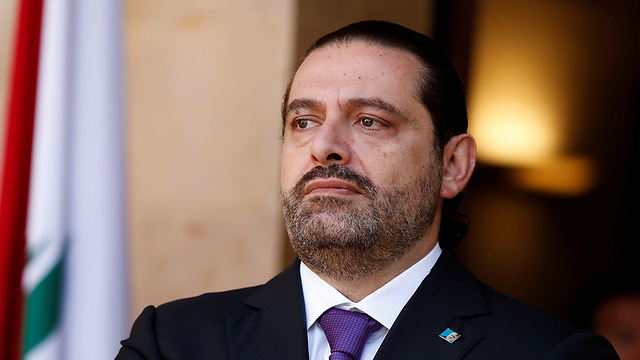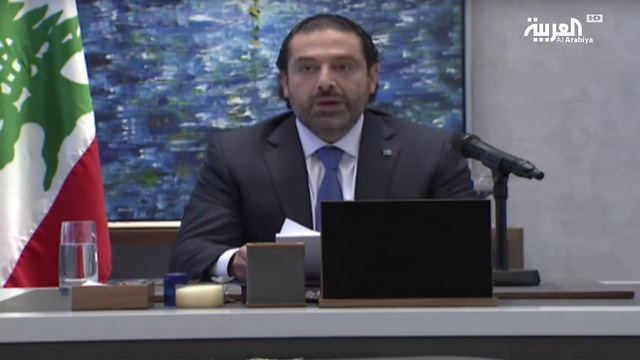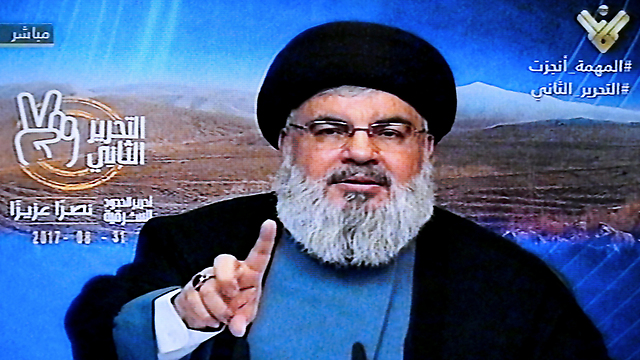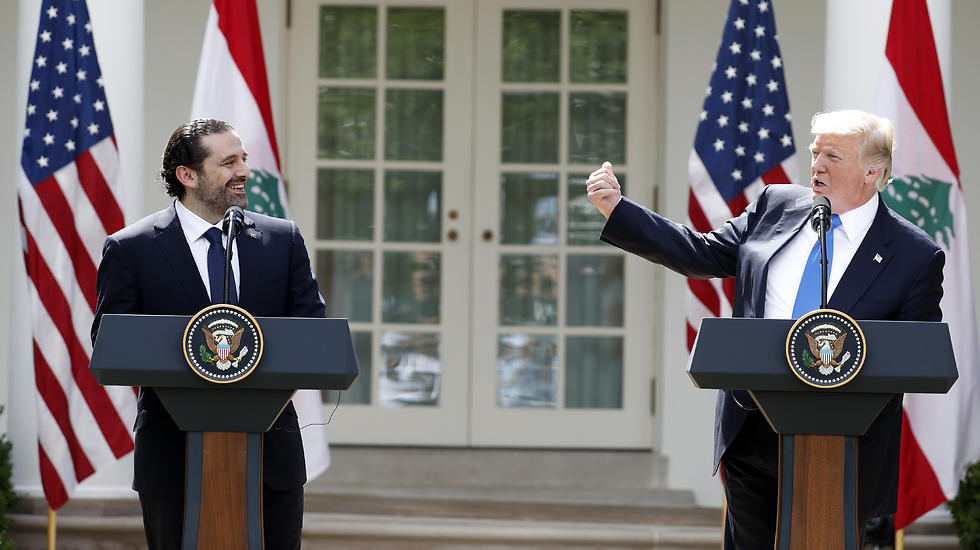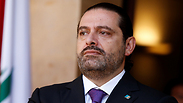

Lebanese prime minister resigns, saying his life in danger
Saad Hariri resigns from his post during a trip to Saudi Arabia in a surprise move that plunges the country into uncertainty amid heightened regional tensions; Al Arabiya reports attempt of Hariri's life was thwarted several days ago, but security forces in Lebanon deny.
Lebanese Prime Minister Saad al-Hariri resigned on Saturday, saying he believed there was an assassination plot against him and accusing Iran and its Lebanese ally Hezbollah of sowing strife in the Arab world.
In a televised address from Riyadh, Hariri launched into a vicious tirade against Iran and its Lebanese proxy Hezbollah for what he said was their meddling in Arab affairs and said “Iran’s arms in the region will be cut off.”
“The evil that Iran spreads in the region will backfire on it,” Hariri said, accusing Tehran of spreading chaos, strife and destruction throughout the region. He added that Iran was "losing in its interference in the affairs of the Arab world", adding that Lebanon would "rise as it had done in the past."
Hariri was appointed prime minister in late 2016 and headed a 30-member national unity cabinet that included the Shiite militant Hezbollah. The government has largely succeeded in protecting the country from the effects of the civil war in neighboring Syria.
The country is sharply divided along a camp loyal to Saudi Arabia, headed by the Sunni Muslim Hariri, and a camp loyal to Iran represented by Hezbollah. President Michel Aoun, who was elected in October 2016 after more than two years of presidential vacuum, is a close ally of Hezbollah.
His election was made possible after Hariri endorsed him for president, based on an understanding that Aoun would then appoint him as prime minister.
In a statement, the presidential office said Aoun was informed by Hariri in a phone call of his resignation, adding that the president now awaits Hariri’s return to the country to clarify the circumstances of his resignation and proceed accordingly.
Hariri's bombshell resignation Saturday was expected to raise tensions in the country and ushers in a stage of deep uncertainty and potential instability, throwing into doubt parliamentary elections slated for early next year which have been repeatedly delayed.
It also shatters a coalition government formed last year after years of political deadlock, and which was seen as representing a victory for Shi'ite Hezbollah and Iran.
Furthermore, Hariri's resignation thrusts Lebanon back into the frontline of Saudi-Iranian regional rivalry and seems likely to exacerbate sectarian tensions between Lebanese Sunni and Shi'ite Muslims.
In his speech, Hariri suggested he feared for his life and said the climate in the country is similar to the one that existed before his father, the late prime minister Rafik Hariri, was assassinated in 2005.
“We are living in a climate similar to the atmosphere that prevailed before the assassination of martyr Rafik al-Hariri. I have sensed what is being plotted covertly to target my life,” he said.
Several Hezbollah members are being tried in absentia for the elder Hariri's killing by a UN-backed tribunal in The Hague, Netherlands. Hezbollah denies any involvement.
Meanwhile, after Hariri announced his resignation, the Saudi-owned pan-Arab Al Arabiya news network reported an attempt on Hariri's life was thrwarted in Beirut several days ago, citing an unnamed source.
"Those who planned to assassinate prime minister Hariri deactivated the observation towers while his motorcade was passing by," Arabiya cited the source as saying.
The report has yet to receive any official confirmation, while OTV, a channel affiliated with Aoun, claimed security forces in the country denied the reports of an assassination attempt.
Hezbollah has sent thousands of its fighters to Syria to shore up President Bashar Assad’s government. The group’s intervention in Syria is highly controversial in Lebanon.
The Lebanese government has adopted an official position of "disassociation" from the conflict, but this has come under strain in recent months with Hezbollah and its allies pushing for a normalization of ties with Assad.
Since taking office, Hariri had worked to garner international aid for Lebanon to cope with the strain of hosting some 1.5 million refugees from neighboring Syria, seeking billions of dollars to boost its sluggish economy.
Hariri said on Saturday that Hezbollah and Iran had brought Lebanon into the "eye of a storm" of international sanctions. He said Iran was sowing strife, destruction and ruin wherever it went and accused it of a "deep hatred for the Arab nation."
His attacks on Hezbollah come on the heels of new US sanctions on the group that many fear will impact negatively on the Lebanese economy.
"Over previous decades, Hezbollah was able to impose a reality in Lebanon with the power of its weapons, which it claims is the (anti-Israel) resistance's weapons, which are aimed at the chests of our Syrian and Yemeni brothers, not to mention the Lebanese," Hariri said.
He said the Lebanese people were suffering from Hezbollah's interventions, both internally and at the level of their relationships with other Arab countries.
“I declare my resignation from the premiership of the Lebanese government, with the certainty that the will of the Lebanese is strong,” Hariri said.
“When I took office, I promised you that I would seek to unite the Lebanese, end political division and establish the principle of self-sufficiency, but I have been unable to do so. Despite my efforts, Iran continues to abuse Lebanon,” he said.
In the first Iranian comment, Hussein Sheikh al-Islam, an adviser to Iran's foreign minister, described Hariri's resignation as unwise and said "it does not bode well for Lebanon." In comments to al-Alam TV, he said both the US and Saudi Arabia are seeking an escalation.
"Hariri's resignation was done with planning by Donald Trump, the president of America, and Mohammed bin Salman, the crown prince of Saudi Arabia, to destabilise the situation in Lebanon and the region," said al-Islam in remarks to a state broadcaster.
Saudi Arabia's influential Gulf Affairs Minister Thamer al-Sabhan, who met Hariri in Riyadh this week, echoed the language of the Lebanese politician saying in a Tweet: "The hands of treachery and aggression must be cut off."
Earlier this week, al-Sabhan sharply criticized Hezbollah, calling for its “toppling” and promising “astonishing developments” in the coming days during an interview with the Lebanese TV station MTV.
Al-Sabhan met with Hariri in Saudi Arabia when the now resigned prime minister was visiting earlier this week. Hariri abruptly returned to the kingdom later Friday before his bombshell announcement Saturday.
In tweets after meeting Hariri, al-Sabhan described it as “long and fruitful meeting” that resulted in agreements over many issues that concern the Lebanese. “What’s coming is better, God willing,” al-Sabhan tweeted on Tuesday. In a series of tweets, al-Sabhan criticized the Lebanese government for tolerating Hezbollah’s criticism of the kingdom.
He earlier said that those who cooperate with Hezbollah must be “punished.”
Roi Kais contributed to this story.














